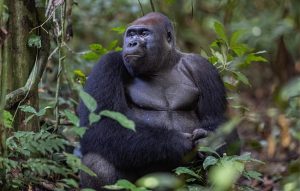As a result of a thorough process based on the Key Biodiversity Area (KBA) Standard, Nouabalé-Ndoki National Park, which has been under the World Conservation Society (WCS) management for over 30 years, has become the first site in the world to be recognised for its ecological integrity – a measure of the region’s robust natural processes and resilience against disturbances.

The KBA Standard, published by the International Union for Conservation of Nature (IUCN), sets rigorous criteria for identifying sites that are globally significant for the persistence of biodiversity. The Ecological Integrity criteria specifically focus on areas that remain undisturbed by significant impacts, thereby preserving their structure, composition, and function.
Covering 4,000 square kilometres of lowland rainforest and harboring crucial populations of endangered mammals, Nouabalé-Ndoki National Park has never been logged, contains no roads within its borders, still boasts wildlife that has had little or no contact with humans, and plays a demonstrated role in climate regulation and carbon storage.
Using satellite imagery and field surveys of key species such as forest elephants, gorillas and chimpanzees, WCS field biologists and the KBA secretariat in Cambridge (UK) assessed forest condition and wildlife abundance throughout northern Congo and Gabon and were able to demonstrate that the Park possesses exceptional ecological integrity.
Identifying and protecting areas of high ecological integrity is essential for conserving biodiversity, mitigating the effects of climate change, safeguarding against zoonotic pandemics, and maintaining the vital ecosystem services these areas provide.
Supported by the Bezos Earth Fund to the KBA partnership through Birdlife International and implemented through a partnership between WCS and the Government of Congo, the KBA identification process “is a significant milestone for global conservation efforts,” said Richard Malonga, Country Director of WCS.
“By recognising areas of high ecological integrity, we are ensuring the protection of ecosystems that are vital for the survival of countless species and the overall health of our planet,” he added.
“This project contributes to the ongoing efforts in our country by addressing biodiversity challenges, influencing action priorities to achieve the post-2020 global agenda goal on one hand, and developing a 30×30 action plan on the other.” commented Arlette Soudan Nonault, Minister for the Environment, Sustainable Development and the Congo Basin, during one of the meetings that led to the recognition of the Park’s ecological integrity.
This result is a testament to the Republic of the Congo’s commitment to preserving its natural heritage. It underscores the exceptional global importance of the Congo Basin’s intact landscapes and the values they hold for people and the planet.
This designation comes at a critical time, as the international community ramps up efforts to meet global biodiversity targets under the Kunming-Montreal Global Biodiversity Framework.
